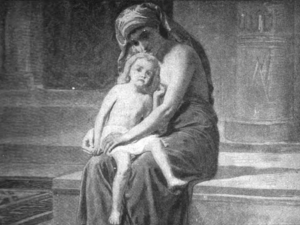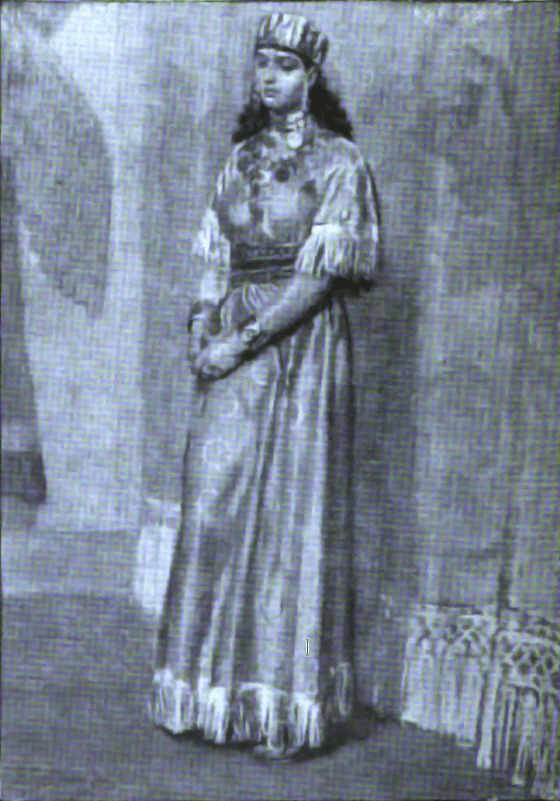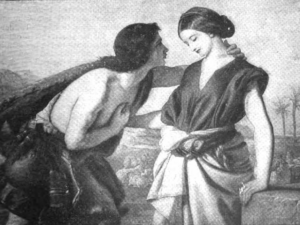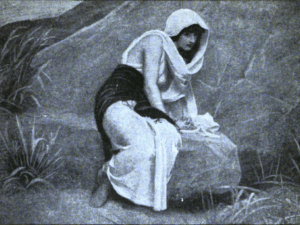As long as the world exists people will speak about two women whose names and stories are contained in the Bible. Their stories stand out in the Bible as stars in the sky. We cannot think of life without them. One of these women was Eve, the first woman, whom a great poet beautifully calls “the fairest of her daughters.” The other was the mother of Jesus. One of these women brought Despair into the world; the other, Hope. We shall read their stories in their proper place. The Bible tells us of many other women, some wicked and some good; and we shall read their stories, too. Here we read of six great and brave women of the Old Testament, and in our next Bible Stories we shall come to the real stories, of which the Bible is full.
HEROINES OF THE OLD TESTAMENT
DEBORAH, whose name means “a bee,” is a woman who reminds us of our great British Queen Boadicea, or of the wonderful French maid Joan of Arc. She was a warlike patriot. She loved her people with a divine enthusiasm. She went with them even into battle. We are told that she was married to a man named Lapidoth, and it is very interesting to hear that she lived under a tree in Mount Ephraim, because another Deborah, the nurse of Rebekah, was buried under a tree, known as “the oak of weeping.”
The great and prophetic Deborah was a woman who thought about God, and prayed to Him and tried to learn His wishes. She lived in evil days for her people. Their pitiful sins had brought them into slavery, and this once proud nation of Israel, the favoured race of Almighty God, were now bitterly now bitterly oppressed by their masters, the Canaanites. They were slaves. Deborah prayed to God in the bitterness of her heart, for she was shamed by her people; and God sent His light into her heart, and she uttered prophecies. Thoughtful men among the poor Israelites came to consult with her. They would sit under the shade of the tree where she dwelt with her husband, and they would speak sadly of the disasters which had overtaken their race; and Deborah would declare to them the commandments of their great God, the God of their father Israel, and bestir them to act valiantly as became a nation of heroes. At last they made her a judge over them. Such is the fame of Deborah that even in these days, when a great patriotic woman arises, men say: “She is a mother in Israel.”

Not such a brave story, but a more beautiful one, is the story of Ruth. It is a perfectly-told story of unselfish love. Ruth is a heroine. This foreign girl loved her motherin-law, and felt full of sorrow for the poor, lonely widow; and she gave up the home of her own father, and forsook the land in which she had lived all the days of her life; and, like a true heroine, made the journey with her aged mother-in-law into a strange country. Of what befell the brave and tender-hearted girl in that land we shall read when we come to tell her story in full.

HANNAH is a name which tells us of a woman’s highest courage. She was brave in a very quiet and simple way, but she well deserves the title of heroine. She was a married woman, who used to go to the Temple and pray very earnestly that God in His mercy would grant her a son. The old priest Eli, sitting there, beheld the woman and marked how earnestly she prayed. He was a grim and stately old man, who dwelt very much alone in the Temple, and sorrowed for the evil of the Hebrew people, and prophesied the wrath and indignation of God against them. He spoke to Hannah, and she told him that she prayed to God, saying that if He would give her a son she in her turn would give the child to God. “Go in peace,” answered the old hero; “and the God of Israel grant thee thy petition that thou hast asked of Him.”
A child was born to her, and she called him Samuel, which means, according to some people, “asked of God” or “lent to God.” Hannah’s heroism lies in this, that she kept her promise. It is the story of a mother’s sacrifice. Loving her child, her only child, with a mother’s sacred passion, and finding joy in watching him as he lay asleep or sat upon her knee gazing out of infant eyes at the green world stretching from before her door, yet she fulfilled her promise – brought the child to Eli, and gave him up to serve God in the Temple.
She was surely as noble a mother as Abraham was a noble father. Samuel proved himself a worthy son of so good and sweet a mother; and God rewarded her in the glory which came to Israel through this son she had given up so nobly and so heroically.

Another heroine of the Old Testament, one whose story reads like a romance from Arabian fairy stories, is Esther. This Esther was a beautiful Jewess, who lived with a poor cousin named Mordecai in the country of a powerful king. It chanced that this great king became suddenly enraged against his queen, and banished her from his palace. Then his messengers went far and wide in search of the most beautiful maiden in that land – for the king’s wife must have no rival in beauty. And one of these messengers came upon the little Esther, who was surpassingly lovely, and he brought her before the king. The king looked upon her and loved her. He did not ask her if she were a Jew; it was enough for him that she was a beautiful and pure girl. And he lifted her up and set her at his side, and she became his queen.
It would have been easy for Queen Esther to forget her afflicted fellow countrymen, but Esther, this “beggar on horseback,” this despised little Jewess, set upon a queen’s throne, risked luxury, happiness, power, riches, honour – yes, life itself, and stood before the king, and saved her people. Perhaps there was as much courage in her act as in the deeds of brave soldiers whose calm in the face of death sends a thrill through our blood. Esther’s story shows us how patriotism will flourish even in the midst of luxury, and even in the heart of a pleasure-loving woman.

A name almost eternal in fame is that of Rachel, and yet her story tells little of herself, and is almost wholly concerned with the man who loved her, Jacob the wanderer. We only know of her through the faithful love of Jacob, but we may be sure that a woman who could inspire such a glorious devotion must have been herself inspired by the glory of God. She is a heroine of the Bible, because she shows us how a good woman may create in the heart of her lover the noblest honour and the purest patience.

There is one other woman we must mention. This is Hagar, a poor slave, whose story is full of a quiet heroism, very simple and beautiful – the heroism of submission. Some are heroes by conquering difficulties; Hagar belongs to those others who are heroes by submitting themselves to bear all things.
Patient till the last, this Egyptian slave-girl, who lived to see her son the founder of a despised and wandering people, left behind for all ages an example of patience and submission which has helped thousands of men and women to bear the cruel slavery of tyrants.
Hagar is a very different heroine from the warlike Deborah; but there is far more need in the world for Hagars than for Deborahs, and poor Hagar, sheltering her despised son in the wilderness, is a picture of motherhood which reminds us of a still greater motherhood in the Bible – the beautiful motherhood of the mother of our Lord. It is through such women as these that men become nobler and life sweeter.
We shall never know, till God reveals all secrets, how many men and women have risen to honour and glory through the example of poor Hagar.
